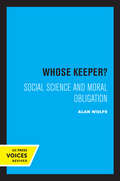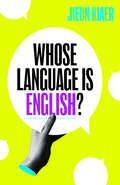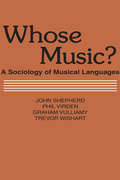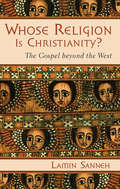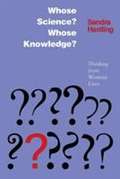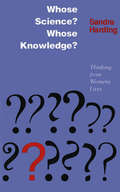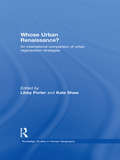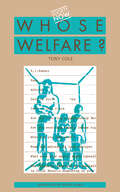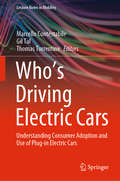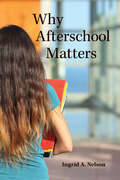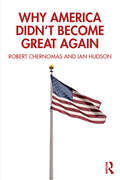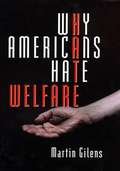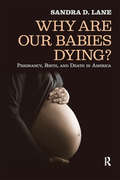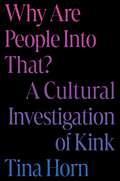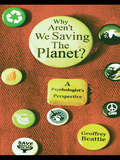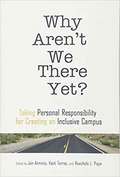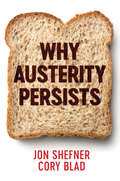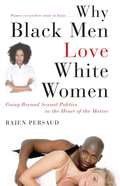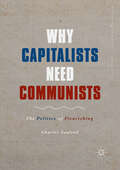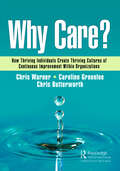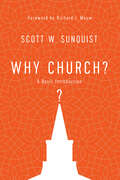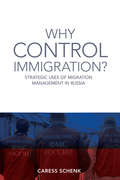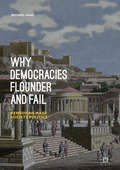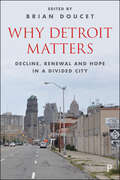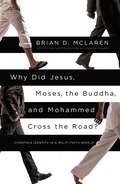- Table View
- List View
Whose Keeper?: Social Science and Moral Obligation
by Alan WolfeWhose Keeper? is a profound and creative treatise on modernity and its challenge to social science. Alan Wolfe argues that modern liberal democracies, such as the United States and Scandinavia, have broken with traditional sources of mortality and instead have relied upon economic and political frameworks to define their obligations to one another. Wolfe calls for reinvigorating a sense of community and thus a sense of obligation to the larger society. This title is part of UC Press's Voices Revived program, which commemorates University of California Press’s mission to seek out and cultivate the brightest minds and give them voice, reach, and impact. Drawing on a backlist dating to 1893, Voices Revived makes high-quality, peer-reviewed scholarship accessible once again using print-on-demand technology. This title was originally published in 1989.
Whose Language Is English?
by Jieun KiaerAn exhilarating new account of the English language, from British colonialism to the age of social media, emphasizing dynamism and democratization Whose language is English? Although we often think of it as native to one place, today there are many Englishes. About seventy-five countries are now using English as their official or first language, and the number of people speaking it around the world continues to rise. But the makeup of the English-speaking population is changing. The proportion of speakers for whom English is a first language, for instance, is decreasing, due to the explosion in popularity of English as a second language. In this ambitious book, Jieun Kiaer explores the lives of English words in the twenty-first century, when the creation and use of language has become an increasingly dynamic, interactive, and diverse process in which ordinary people have taken leading roles—offering such coinages as “flexitarian,” “MeToo,” “glow up,” and “shitizen” to “No sabo kids” and beyond. As English language grows ever more diverse, Kiaer believes, we need a paradigm shift. We must acknowledge that all varieties of English are languages in their own right when they are used by a community of speakers. English is a language that belongs to everyone. Considering the effects of social media, the Covid-19 pandemic, virtual work, globalization, and artificial intelligence, Kiaer paints a compelling portrait of a diffuse, rapidly evolving language characterized by creativity and democratization.
Whose Music?: Sociology of Musical Languages
by John ShepherdWhose Music? combines historical, musicological, and sociological materials and styles of analysis in ways that connect to the field of sociology. The analyses of social class systems presented here speak in translatable ways to analyses of musical forms. Not only that, both are connected to an understanding of the organizations through which works are distributed to their audiences. Perhaps most importantly for the contemporary reader, this book depicts the part of the process by which dominant class groups justify their domination--cultural and otherwise.
Whose Religion Is Christianity?: The Gospel beyond the West
by Lamin SannehMany historians of religion now recognize that Christianity is a global faith whose most vibrant expression and growth are found today in the non-Western world. But no one explores this reality and its implications for modern life with the depth of learning and personal insight of Lamin Sanneh.This book is unique in the literature of world Christianity, not least for its novel structure. Sanneh's engaging narrative takes the form of a self-interview in which he asks questions about the cross-cultural expansion of Christianity and provides insightful answers and meaningful predictions about the future. This technique also allows Sanneh to track developments in world Christianity even while giving attention to the responses and involvement of indigenous peoples around the world.Sanneh's own background and lifelong involvement with non-Western cultures bring a richness of perspective not found in any other book on world Christianity. For example, Sanneh highlights what is distinctive about Christianity as a world religion, and he offers a timely comparison of Christianity with Islam's own missionary tradition. The book also gives pride of place to the recipients of the Christian message rather than to the missionaries themselves. Indeed, Sanneh argues here that the gospel is not owned by the West and that the future of the tradition lies in its "world" character.Literate, relevant, and highly original, Whose Religion Is Christianity? presents a stimulating new outlook on faith and culture that will interest a wide range of readers.
Whose Science? Whose Knowledge?: Thinking From Women's Lives
by Sandra HardingSandra Harding here develops further the themes first addressed in her widely influential book, The Science Question in Feminism, and conducts a compelling analysis of feminist theories on the philosophical problem of how we know what we know. Following a strong narrative line, Harding sets out her arguments in highly readable prose. In Part 1, she discusses issues that will interest anyone concerned with the social bases of scientific knowledge. In Part 2, she modifies some of her views and then pursues the many issues raised by the feminist position which holds that women's social experience provides a unique vantage point for discovering masculine bias and and questioning conventional claims about nature and social life. In Part 3, Harding looks at the insights that people of color, male feminists, lesbians, and others can bring to these controversies, and concludes by outlining a feminist approach to science in which these insights are central. "Women and men cannot understand or explain the world we live in or the real choices we have," she writes, "as long as the sciences describe and explain the world primarily from the perspectives of the lives of the dominant groups. "Harding's is a richly informed, radical voice that boldly confronts issues of crucial importance to the future of many academic disciplines. Her book will amply reward readers looking to achieve a more fruitful understanding of the relations between feminism, science, and social life.
Whose Science? Whose Knowledge?: Thinking from Women's Lives
by Sandra HardingSandra Harding here develops further the themes first addressed in her widely influential book, The Science Question in Feminism, and conducts a compelling analysis of feminist theories on the philosophical problem of how we know what we know. Following a strong narrative line, Harding sets out her arguments in highly readable prose. In Part 1, she discusses issues that will interest anyone concerned with the social bases of scientific knowledge. In Part 2, she modifies some of her views and then pursues the many issues raised by the feminist position which holds that women's social experience provides a unique vantage point for discovering masculine bias and and questioning conventional claims about nature and social life. In Part 3, Harding looks at the insights that people of color, male feminists, lesbians, and others can bring to these controversies, and concludes by outlining a feminist approach to science in which these insights are central. "Women and men cannot understand or explain the world we live in or the real choices we have," she writes, "as long as the sciences describe and explain the world primarily from the perspectives of the lives of the dominant groups." Harding's is a richly informed, radical voice that boldly confronts issues of crucial importance to the future of many academic disciplines. Her book will amply reward readers looking to achieve a more fruitful understanding of the relations between feminism, science, and social life.
Whose Urban Renaissance?: An international comparison of urban regeneration strategies (Routledge Studies in Human Geography)
by Libby Porter Kate ShawThe desire of governments for a 'renaissance' of their cities is a defining feature of contemporary urban policy. From Melbourne and Toronto to Johannesburg and Istanbul, government policies are successfully attracting investment and middle-class populations to their inner areas. Regeneration - or gentrification as it can often become - produces winners and losers. There is a substantial literature on the causes and unequal effects of gentrification, and on the global and local conditions driving processes of dis- and re-investment. But there is little examination of the actual strategies used to achieve urban regeneration - what were their intents, did they 'succeed' (and if not why not) and what were the specific consequences? Whose Urban Renaissance? asks who benefits from these urban transformations. The book contains beautifully written and accessible stories from researchers and activists in 21 cities across Europe, North and South America, Asia, South Africa, the Middle East and Australia, each exploring a specific case of urban regeneration. Some chapters focus on government or market strategies driving the regeneration process, and look closely at the effects. Others look at the local contingencies that influence the way these strategies work. Still others look at instances of opposition and struggle, and at policy interventions that were used in some places to ameliorate the inequities of gentrification. Working from these stories, the editors develop a comparative analysis of regeneration strategies, with nuanced assessments of local constraints and counteracting policy responses. The concluding chapters provide a critical comparison of existing strategies, and open new directions for more equitable policy approaches in the future. Whose Urban Renaissance? is targeted at students, academics, planners, policy-makers and activists. The book is unique in its geographical breadth and its constructive policy emphasis, offering a succinct, critical and timely exploration of urban regeneration strategies throughout the world.
Whose Welfare
by Tony ColeFirst Published in 1986. Routledge is an imprint of Taylor & Francis, an informa company.
Who’s Driving Electric Cars: Understanding Consumer Adoption and Use of Plug-in Electric Cars (Lecture Notes in Mobility)
by Marcello Contestabile Gil Tal Thomas TurrentineThis book offers a comprehensive yet accessible snapshot of the latest consumer research on the adoption and use of electric vehicles. It discusses the importance of developing a better understanding of consumer behavior in relation to electric vehicles, and the advantages that can be gained from the growing number of electric vehicle users, who can now be studied directly. In turn, it systematically analyzes the leading markets for electric vehicles in North America, Europe and Asia. Bringing together the experience and expertise of authoritative researchers and practicing professionals, the book shares a wide range of empirical data obtained at the national level and summarizes the general lessons learned. The last part of the book discusses policy-relevant insights, forecasts the future evolution of the field in terms of methods and data availability, and addresses several key questions that policymakers and other stakeholders are currently facing.
Why Afterschool Matters
by Ingrid A. NelsonIncreasingly, educational researchers and policy-makers are finding that extracurricular programs make a major difference in the lives of disadvantaged youth, helping to reduce the infamous academic attainment gap between white students and their black and Latino peers. Yet studies of these programs typically focus on how they improve the average academic performance of their participants, paying little attention to individual variation. Why Afterschool Matters takes a different approach, closely following ten Mexican American students who attended the same extracurricular program in California, then chronicling its long-term effects on their lives, from eighth grade to early adulthood. Discovering that participation in the program was life-changing for some students, yet had only a minimal impact on others, sociologist Ingrid A. Nelson investigates the factors behind these very different outcomes. Her research reveals that while afterschool initiatives are important, they are only one component in a complex network of school, family, community, and peer interactions that influence the educational achievement of disadvantaged students. Through its detailed case studies of individual students, this book brings to life the challenges marginalized youth en route to college face when navigating the intersections of various home, school, and community spheres. Why Afterschool Matters may focus on a single program, but its findings have major implications for education policy nationwide.
Why America Didn't Become Great Again
by Ian Hudson Robert ChernomasExamining the conditions that not only blocked attempts to make America great again but also actively made the country worse, Why America Didn’t Become Great Again identifies those organizations, institutions, politicians, and prominent characters in the forefront of the economic and social policies – ultimately asking who is responsible.The period from the late 1970s to 2020s became the best of times for America’s corporate class. As profits grew along with the wealth and income that they delivered for their stockholders and management, their goal was to set new rules for the rest of us to live by with a clear class agenda. Institutions have been organized, government policies reoriented, and economists, journalists, and politicians recruited, funded, and promoted. And so it has not been the best of times for working families, as inequality, stagnant wages, debt, and ever longer working hours became their fate. This book critically analyzes those who very deliberately set out to implement policies enacted at the state and federal level in order to redistribute wealth and income upwards and change the balance of power in the United States in response to the class, gender, and racial challenges that resulted in compressed income and wealth differentials before the 1980s.An essential book on contemporary inequality in America, Why America Didn’t Become Great Again surveys the past near half century that resulted in American economic instability and inequality, environmental crisis, a crumbling physical and harmful social infrastructure, among the very worst health outcomes, child poverty, food insecurity, and social mobility of the industrialized countries culminating in a Trump regime and the road to further ruin.
Why Americans Hate Welfare: Race, Media, and the Politics of Antipoverty Policy
by Martin GilensTackling one of the most volatile issues in contemporary politics, Martin Gilens's work punctures myths and misconceptions about welfare policy, public opinion, and the role of the media in both.
Why Are Our Babies Dying?: Pregnancy, Birth, and Death in America
by Sandra LaneSyracuse, New York, in the late 1980s led U.S. cities in African American infant deaths. Even today, in this "all American city," infants of color die more than two times as often as white babies. Infant mortality is too often addressed as if it were an isolated problem, rather than part of a systemic and repeating pattern of embedded racism and structural violence. The clearing of whole neighborhoods during urban renewal, coupled with the collapse of industry, brought unintended consequences. Dilapidated rental housing, abandoned houses, and empty lots provide the conditions for lead poisoning, gonorrhea, and illicit drug use. Inadequate education, unemployment, and racially biased arrest and sentencing underpin the epidemic of African American male incarceration. Inmate fathers cannot provide financial support and only limited emotional support during collect calls from jail or prison. Supermarkets fled the inner city, where corner stores sell cigarettes, malt liquor, lottery tickets, and drug paraphernalia in place of healthy food. The stories and the data in this book show that low birth weight, premature birth, and infant death are a part of life patterns resulting from systemic discrimination increasing risk over a lifetime and, in some cases, reaching the next generation.
Why Are People Into That?: A Cultural Investigation of Kink
by Tina HornFrom a #1 Apple podcast host, Lambda Literary fellow, and dominatrix comes a sex-positive, judgment-free cultural deep-dive into the world of kink. When celebrated BDSM educator Tina Horn first launched Why Are People Into That?!, publications from Vice to Buzzfeed heralded it as one of the best sex podcasts around. Each episode centered around a different fetish or fantasy, thoughtfully examining why, exactly, different strokes work for different folks. From sex workers and scientists to artists and activists, Tina&’s wide range of guests helped educate fascinated listeners across the world on the wide spectrum of humanity&’s appetites. With her listeners growing more and more insatiable, she soon realized that the only way to address the titular question with all the depth and nuance it deserved was to turn that idea into a book. From spanking, strap-ons, and sluts, to taboos involving cake, chains, and cannibalism, WHY ARE PEOPLE INTO THAT? explores the universal drives that shape even the most specific erotic tastes, and the cultural context that molds and is molded by the way we conceptualize pleasure, gender, fantasy, and power. With buoyant prose, Tina invites us to reconsider everything we thought we knew about sexuality. How, for example, should we think about "consensual nonconsent" in a post-#MeToo era? How does cross-dressing fit in with our evolving cultural understanding of gender performance and identity? And what do foot fetishists, fisters, and FinDoms have in common? Blending insightful cultural criticism, investigative journalism, and spicy anecdotes from Tina&’s 15+ years of hard-earned expertise in the sex industry and beyond, WHY ARE PEOPLE INTO THAT? is a philosophical-but-fun exploration of the prismatic spectrum of human desire and the expansive possibilities of pleasure. For fans of adrienne maree brown and Emily Nagoski, this raunchy and rousing book is perfect for anyone who is interested not only in the intricacies of what we desire, but in how desire itself really works.
Why Aren't We Saving the Planet?: A Psychologist's Perspective
by Geoffrey BeattieGlobal warming. Many of us believe that it is somebody else’s problem, that it will affect other people and that other people will come up with the solution. This is not true. "Global" warming is a global problem: it will affect every single one of us and will only be stopped by a huge shift in our individual attitudes and behaviour. Each time one of us switches on a light, reaches for something in a supermarket, gets into a car or bus, or even chooses what clothes to buy, we are making a choice that can affect the environment. We already know that we need to start making better choices for the sake of our natural world, now. So why aren’t we already saving the planet? This book follows one psychologist’s mission to find some answers to this question. Challenged by a student to use psychology to find the root of the problem, Geoffrey Beattie (an environmental "unbeliever") begins a personal and life-changing journey of discovery. The reader is invited to accompany him as he uses psychological methods to examine people’s attitudes to global warming. Along the way we find the author’s own attitudes being challenged, as well as our own. This ground-breaking book reflects new and innovative research being carried out into how to change attitudes to the environment and how to encourage sustainable behaviour. It is eminently readable and interesting and, as such, should be read by anyone who is concerned about the future of our planet. In fact, you should also read it if you’re not concerned about our planet.
Why Aren't We There Yet?: Taking Personal Responsibility for Creating an Inclusive Campus
by Raechele L. Pope Vasti Torres Jan ArminioDespite seeming endless debate and public attention given to the issue for several decades, those committed to creating welcoming and engaging campus environments for all students recognize that there is considerably more work to be done, and ask “Why aren’t we there yet, and when will we be done?” <p><p> While our campuses have evolved from being exclusionary and intolerant, and publicly espouse the objectives of being welcoming, accepting, affirming, and engaging, the data on admissions, retention, and graduation clearly indicate that these goals have not been achieved. <p><p> The contributors to this book seek to offer new insights to improve student affairs, emphasizing action that recognizes this is a complex and multi-faceted process, and beginning with the assertion that, without recognizing the influences of privilege and inequality, we educators cannot promote truly welcoming environments. <p><p> This book focuses on guiding individuals and groups through learning how to have difficult conversations that lead us to act to create more just campuses, and provides illustrations of multiple ways to respond to difficult situations. It advocates for engaging in fruitful dialogues regarding differing social identities including race, ethnicity, religion, gender, and sexual orientation, to lead readers through a process that advocates for justice, and for taking personal responsibility for contributing to the solution. <p><p> The book is framed around the five elements of the process of engaging in difficult conversations that not only advocate for change but also create change: self knowledge, knowledge of and experiences with others, understanding historical and institutional contexts, understanding how to change the status quo, and transformative action.
Why Austerity Persists
by Jon Shefner Cory BladSeveral nations in the Global North have turned to austerity policies in an effort to resolve recent financial ills. What many failed to recognize is the longer history and varied pattern of such policies in the Global South over preceding decades – policies which had largely proven to fail. Shefner and Blad trace the 45-year history of austerity and how it became the go-to policy to resolve a host of economic problems. The authors use a variety of international cases to address how austerity has been implemented, who has been hurt, and who has benefited. They argue that the policy has been used to address very different kinds of crises, making states and polities responsible for a variety of errors and misdeeds of private actors. The book answers a number of important questions: why austerity persists as a policy aimed at resolving national crises despite evidence that it often does not work; how the policy has evolved over recent decades; and which powerful people and institutions have helped impose it across the globe. This timely book will appeal to students, researchers, and policymakers interested in globalization, development, political economy, and economic sociology.
Why Black Men Love White Women: Going Beyond Sexual Politics to the Heart of the Matter
by Rajen PersaudRajen Persaud brings a refreshingly honest voice to the highly controversial topic of interracial dating as he explores the stereotypes and perceptions associated with it.Why do so many high-profile black men date and marry the most ordinary white women? Why do so many other black men desire and covet the company of white women? And why does this subject deeply touch so many people of both races? Are these provocative questions matters of love, sex, revenge, power, or politics? &“All of the above,&” asserts Rajen Persaud in this illuminating, no-holds-barred book that will have you laughing with recognition while fundamentally changing the way you see just about everything—from sex and marriage to your own gender and race in all its foibles, pretensions, and ultimate possibilities. Challenging every one of our preconceptions about mixed-race relationships, Rajen Persaud's commentary lights up a topic that has only deepened in intensity and relevance in the decades since Sidney Poitier asked the world "Guess who's coming to dinner?" The answers, so deeply ingrained in our fabric as a nation and even grounded in our past, force us to look at ourselves and our culture with new eyes. Why Black Men Love White Women explores multiples factors such as: -Celebrity: From Michael Jordan to Bryant Gumbel to Tiger Woods, high-profile affairs and marriages with no shortage of controversy. -Sex: Are black men choosing white women—or rejecting black women? -Race: How white male insecurity is the key to understanding racism. -Relationships: Is it more than love that brings the races together? -Politics: How fear is used to gain power, from sexual politics to global war. -Media: How movies and television keep black men running to white women. Why Black Men Love White Women will help you understand the relationship phenomenon of our times.
Why Capitalists Need Communists: The Politics of Flourishing (Wellbeing in Politics and Policy)
by Charles SeafordBritain faces huge challenges: inequality, public services under constant pressure, climate change - and in the long term, the impacts of automation and artificial intelligence. At the same time, the political and economic elite seem to have reached an impasse: there is a sense that things can only get worse. In Why Capitalists Need Communists, Charles Seaford demonstrates that this need not be, that radical, progressive change is perfectly possible and that the polarisation and nostalgia afflicting us is not inevitable. History shows that it is precisely when the ruling elite loses confidence – which it has – that significant change happens and that new alliances are formed to take over. Tackling the challenges will take planning, redistribution, re-fashioned business and finance, and a new ideology – one which confirms that we really can create the conditions for more people to flourish. But this is not a pipe-dream. This book sets out just how this can come about, based on interviews with over 50 business people, politicians, analysts and activists. Everyone with an interest in the future should read it.
Why Care?: How Thriving Individuals Create Thriving Cultures of Continuous Improvement Within Organizations
by Chris Butterworth Chris Warner Caroline GreenleeWe live in an ever-changing world in which organizations find it increasingly difficult to stay ahead of the changes needed to be successful without thriving people. The authors believe that when people are valued and respected it improves their overall mental well-being and workplace experience, which in turn, makes them more motivated to help meet the purpose and objectives of the organization and adapt to external drivers.This book explores how mental well-being and a culture of continuous improvement are intertwined and mutually reinforcing. The authors contend that to create a sustainable culture of continuous improvement there must be an organization-wide focus on mental well-being at the individual level. A culture of continuous improvement nurtured in the right way, however, will indeed support mental well-being and help create a thriving organization.The key benefit of the book is demonstrating how important mental well-being is for sustainable organizational success. It explores this through many different lenses such as the individual, teams, leaders, and the organization as a whole, and explains the key elements needed for success. Leaders at all levels are able to understand why mental well-being is critical and how to nurture it in the workplace.In addition, the book explains the importance of diversity, equality, inclusion, and belonging, and how this is integral to mental well-being and a thriving organization. This book provides unique insight into how mental well-being and a culture of continuous improvement are intertwined explaining how thriving people and a thriving culture of continuous improvement create a thriving organization.
Why Church?: A Basic Introduction
by Scott W. SunquistIs a church just something we create to serve our purposes or to maintain old traditions? Or is it something more vital, more meaningful, and more powerful? This can be hard to believe when we look at what happens in any one congregation or denomination. Certainly not all churches act like Jesus in the world, and many individual churches in the West are dying. When it's so easy to be confused, frustrated, or simply apathetic about the church, how should we understand its purpose today? In this appealing introduction to the nature of the local church, set in the context of Christian history and global diversity, historian and missionary Scott Sunquist shows us the church in motion. Why Church? clarifies the two primary purposes of the church—worship and witness—and unpacks what the church is (and ought to be) using five movements of worship: come together stand to praise God kneel to confess sit to listen to the Word of God go out into the world Packed with stories and insights from experiences in churches around the world, this book explores cultural contextualization, the meaning of conversion, worship in both personal and communal aspects, and how mission combines telling the good news with being good news as a community. From Fuller Theological Seminary's renowned church-planting program, this primer is well suited to leaders and their core teams to read together and share with new attenders as they catch the spirit of the dynamic gathering that is the local church.
Why Control Immigration?: Strategic Uses of Migration Management in Russia
by Caress SchenkMigration management in Russia is a window into how public policy, the federal system, and patronage are used to manage conflicting demands. This multi-level balancing act demonstrates the importance of high-level politics, institutional interests and constraints, and the conditions under which government actors at all levels can pursue their own interests as the state seeks political equilibrium. Why Control Immigration? argues that a scarcity of legal labour and the ensuing growth of illegal immigration can act as a patronage resource for bureaucratic and regional elites. Assessing the legal and political context of migration, Caress Schenk blends a political science approach with insights from the comparative immigration literature. Using this framework, she also engages with attitudes on populism and anti-immigration, particularly in terms of how political leaders utilize and employ public opinion in Russia.
Why Democracies Flounder and Fail: Remedying Mass Society Politics
by Michael HaasDemocracy is in crisis because voices of the people are ignored due to a politics of mass society. After demonstrating how the French Fourth Republic failed, wherein Singapore’s totalitarianism is a dangerous model, Washington is enmeshed in gridlock, and there is a global democracy deficit, solutions are offered to revitalize democracy as the best form of government. The book demonstrates how mass society politics operates, with intermediate institutions of civil society (media, pressure groups, political parties) no longer transmitting the will of the people to government but instead are concerned with corporate interests and have developed oligarchical mindsets. Rather than micro-remedy bandaids, the author focuses on the need to transform governing philosophies from pragmatic to humanistic solutions.
Why Detroit Matters: Decline, Renewal and Hope in a Divided City
by Brian DoucetDetroit has come to symbolise deindustrialization and the challenges, and opportunities, it presents. As many cities struggle with urban decline, racial and ethnic tensions and the consequences of neoliberal governance and political fragmentation, Detroit’s relevance grows stronger. Why Detroit Matters bridges academic and non-academic responses to this extreme example of a fractured and divided, post-industrial city. Contributions from many of the leading scholars on Detroit are joined by influential writers, planners, artists and activists who have contributed chapters drawing on their experiences and ideas. The book concludes with interviews with some of the city’s most important visionaries who are engaged in inspiring practices which provide powerful lessons for Detroit and other cities around the world. The book will be a valuable reference for scholars, practitioners and students from across disciplines including geography, planning, architecture, sociology, urban studies, history, American studies, and economics.
Why Did Jesus, Moses, the Buddha, and Mohammed Cross the Road?: Christian Identity in a Multi-Faith World
by Brian D. MclarenWhen four religious leaders walk across the road, it's not the beginning of a joke. It's the start of one of the most important conversations in today's world. Can you be a committed Christian without having to condemn or convert people of other faiths? Is it possible to affirm other religious traditions without watering down your own? In his most important book yet, widely acclaimed author and speaker Brian McLaren proposes a new faith alternative, one built on "benevolence and solidarity rather than rivalry and hostility." This way of being Christian is strong but doesn't strong-arm anyone, going beyond mere tolerance to vigorous hospitality toward, interest in, and collaboration with the other. Blending history, narrative, and brilliant insight, McLaren shows readers step-by-step how to reclaim this strong-benevolent faith, challenging us to stop creating barriers in the name of God and learn how affirming other religions can strengthen our commitment to our own. And in doing so, he invites Christians to become more Christ-like than ever before.
